5th ITB Hospitality Day: Mobile devices lead to new closeness to guests
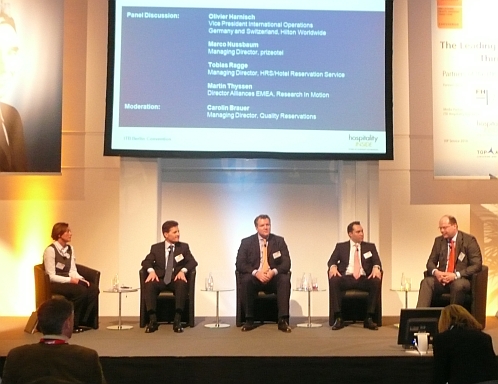 |
|
| Carolin Brauer makes the panelists of the ITB panel explain mobile devices in simple words. / photo: map |
Berlin (April 16, 2010). An app or application is the latest IT boost for both hoteliers and guests. But how soon should this technology be adapted, and what is the relation between costs and benefit for companies? The participants of the mobile devices panel at the 5th ITB Hospitality Day, the hotel conference at ITB Berlin, are all working with apps already. While they expect a bright future for them, they are cautious nonetheless.
“Apps are a key to customers,” said Martin Thyssen, Director Alliances EMEA, Research in Motion/Blackberry, representative of providers, “but it’s important that customers really want to use it. It must be interactive.” First of all, travellers/guests need to know if a hotel offers certain features via app, and that requires additional marketing. Despite this, more and more people are venturing into this new field, as “it comes easier to the new generation,” says Olivier Harnisch, Vice President International Operations Germany and Switzerland of Hilton Worldwide. In the future, you will consider it normal to view hotel brochures or even information in the classic room folder via app.
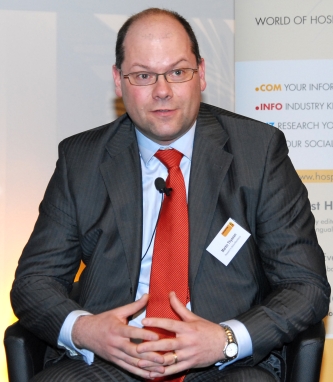 |
|
| Martin Thyssen. |
Hilton, one of the biggest chains in the world, has installed only one app for seven of its ten brands - for reservation (of course, such a reservation can include additional requests like special cushions or room service). According to Harnisch, Hilton’s app is already one of the top downloads today.
Apps are for everybody, even for hotel reservation platforms: within about one year, HRS provides six apps – based on the IT platforms of all major application developers. With their hardware, the three big ones - iPhone, Blackberry, Nokia - hold 40 percent of the world market, says Tobias Ragge, Managing Director HRS. They are trying to gain even more influence, also with respect to distribution channels used for apps. There are so-called “app stores” offering applications generating large amounts of money (the more apps that are downloaded, the more dataflow and the bigger the revenues). HRS recognises growing acceptance among customers: according to Ragge, the portal recorded 100,000 downloads per month and “a few reservations” he added.
 |
|
| Marco Nussbaum. |
Mobile devices: Check-in and room check via mobile phone
His final remark also shows that there is still a big gap between perception and utilization for customers at the moment. Customers still hesitated, but hoteliers hesitated even more, said Martin Thyssen. “Companies lag behind their customers,” he criticised. The exception proves the rule: Marco Nussbaum, Managing Director of the prizeotel budget design hotel in Bremen has integrated the IT innovations in his concept right from the start. Accordingly, guests booking online receive their room number via SMS and can check in with their mobile phone (via code signal) right at the door to their room. “Dealing with mobile devices, however, means more than just integrating apps,” he continues. “For example, iPod access is a reservation criterion in our hotel.” There is even an internal app - for the room maids. They use it for quality checks.
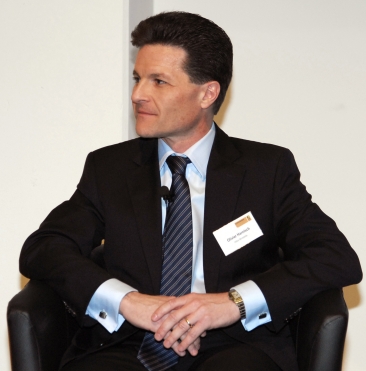 |
|
| Olivier Harnisch. |
Apps enable completely new “pull marketing methods”: it is possible to lead guests to products by addressing their needs precisely. It is possible to check bets at the beach, find out the opening hours of the hotel’s Kids Club via iPhone or book a golf session. “We’re closer to the guests than ever before,” emphasises Martin Thyssen. “RevPAC is becoming increasingly important due to mobile devices.” This new term specifies the “revenue per available customer” (in contrast to RevPAR – revenue per available room).
Minimum investment for hoteliers: 20,000 euros
Before generating revenues and profits, there has to be an investment. Tobias Ragge evaluated the costs for an app to be at least 20,000 euros. “This sort of investment doesn’t pay off for individual hotels,” he pointed out clearly. “The correct follow-up question is: how do you make money from apps? There are initial approaches.”
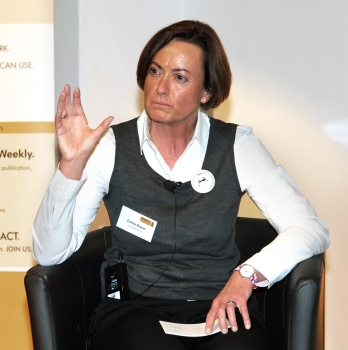 |
|
| Carolin Brauer. |
Tobias Ragge observed: Google had just bought a company for mobile advertising, while Nokia acquired a global navigation specialist. “Apps will become the gold mines of commercialisation,” forecasts Ragge estimating for his own company: “30 percent of HRS revenues will be generated through mobile devices in the future.”
Advertisement is clearly one way of refinancing. From a provider’s view, such as Blackberry, “it would be great if guests passing by the spa immediately got an offer,” says Thyssen raving on, but he also asks: “Do guests want that?” However, the potential is enticing: in Japan, 60 percent of mobile phone users, 20 million people, use their mobile device for online activities.
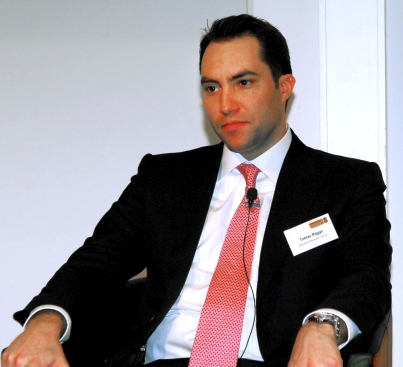 |
|
| Tobias Ragge. |
From e-commerce to m-commerce
With this, “e-commerce is becoming m-commerce”, said Caroline Brauer, Managing Director of Quality Reservations in Langenhagen, commenting on the change. The era of “mobile commerce” is about to start. As expert for distribution and IT, she showed great finesse in moderating the panel discussion and mastering the complex issue in a clearly understandable language. At the end of the discussion, she directed the focus to data security. Martin Thyssen’s commentary: when it came to mobile devices, the same security standards needed to apply as in the Internet – particularly with respect to electronic payment.
The conclusion of the panellists: customers are the driving force behind the current development, and apart from the big hotel chains, individual small hotels demonstrate a high degree of creativity. The fact that networks and devices are available for the broad masses makes realisation possible. “We’ll see many new ideas!” said Martin Thyssen, and Tobias Ragge added: “We are at the beginning of a completely new era.” / Maria Puetz-Willems
March 26, 2010 Sit down and think - ITB Hospitality Day: Innovation panel pleading a mental restart
To print this article you have to be registered and logged in for newsletter, visitor or subscription.





